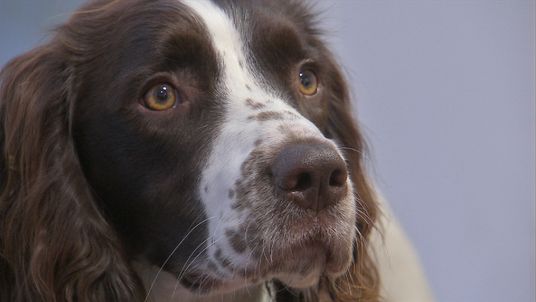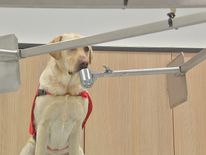humans
Dogs can detect a drop of blood in two Olympic-sized pools, and it’s hoped their sniffing talents could help diagnose humans.
07:02, UK,Saturday 31 December 2016
A major trial is under way in Milton Keynes using dogs to detect prostate cancer.
The programme is part-funded by the NHS and is being run by the Medical Detection Dogs charity.
Eight dogs are undergoing training using samples from real prostate cancer patients at Milton Keynes University Hospital.
The study aims to prove how accurately dogs can detect human cancer.
Bio-detection training manager Rob Harris said: “These dogs are being trained to detect the volatile signature for prostate cancer, so what they’re using is their incredible sense of smell to analyse all of these chemicals that are coming off the urine sample and then they’re looking for a pattern that’s specific to prostate cancer.”
The dogs are all pets living with families, and have each been selected for their ability to sniff.
Impressively, the dogs can detect the equivalent of a single drop of blood in two Olympic-sized swimming pools.
That’s why the charity believes dogs can make a real difference to prostate cancer detection.
A mixture of breeds are involved in the study, including Labradors and working spaniels.
Dr Claire Guest, the chief executive of Medical Detection Dogs, explained: “The dog is a bio-sensor, a highly sophisticated bio-sensor, with 300 million sensors. Just because he has a furry coat and a waggy tail doesn’t make the science any less real.
“If we can prove the accuracy of these dogs and have a test that’s 90% reliable, then that’s the most reliable test currently available in prostate testing.”
Despite affecting one in seven men, prostate cancer is notoriously difficult to diagnose.
There’s no single test, and the current procedure generally involves a blood test, known as a PSA test, a physical examination and a biopsy.
The current blood test fails to detect prostate cancer in up to 15% of men, and gives a false positive in 76% of cases.
Chris Eglinton’s diagnosis took nearly four months, but he was lucky and his treatment has worked. The long wait made his experience all the more difficult.
“I was worried,” he says. “You realise why you’re being tested because you ask all the questions. As soon as the magic word or the dreadful word ‘cancer’ is mentioned, you really do feel terrible and I had to go home from the examination and tell my wife and family what the problem was, so it’s quite frustrating.”
Mr Eglinton welcomes the idea of diagnosis by dog.
But at Prostate Cancer UK, they’re not as enthusiastic and are worried the science doesn’t add up.
Dr Iain Frame, the charity’s director of research said: “The researchers themselves have problems in identifying what’s an aggressive and non-aggressive cancer by using dogs.
“So we know the dogs are detecting something in urine but we don’t know what it is and we don’t know whether it’s aggressive or non-aggressive, so that in a sense doesn’t take us any further forward.”
Medical Detection Dogs say their three-year trial will look at differentiating the severity of cancers.
They’re hopeful the work will lead to an NHS screening programme involving their dogs.
[“source-ndtv”]



